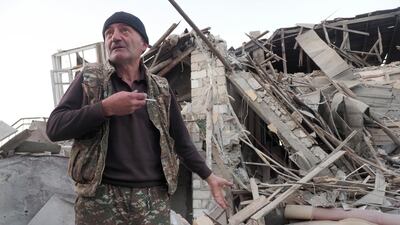Armenia and Azerbaijan accused each other of breaching a new humanitarian truce in the bitter fighting over the Nagorno-Karabakh region.
The truce came into force yesterday at midnight local time, but Yerevan’s Defence Ministry spokeswoman Shushan Stepanyan said that Azerbaijan fired shells and rockets in the early hours of yesterday, minutes after the cessation began.
Azerbaijan’s state news agency reported that mortars and artillery were fired by Armenia at the south-western district of Jabrayil, as well as at villages along the Aras River.
Saturday’s truce declaration followed an escalation in fighting and a missile strike that killed 13 civilians, in Azerbaijan’s second largest city of Ganja.
Azeri President Ilham Aliyev vowed to take revenge for the attack.
The attacks in the early hours of yesterday morning, which included a strike on the western Azeri city of Mingacevir, came hours after Azerbaijani forces shelled Stepanakert, the capital of ethnic-Armenian Nagorno-Karabakh.
A previous truce brokered by Russia last Saturday to allow the warring sides to exchange prisoners and bodies and begin talks quickly broke down, with both sides accusing the other of breaches.
Azerbaijan and the Armenian separatists who control the Nagorno-Karabakh region have been locked in a bitter battle over the fate of the mountainous area since a war in the 1990s during which 30,000 people were killed.
Clashes erupted again three weeks ago and have killed at least 700 people, threatened to draw in regional powers Russia and Turkey, and raised alarm over the failure of a decades-long international mediation process.
The real death toll is probably much higher because Azerbaijan has not published the fatalities among its soldiers.
With neither side making decisive gains – and a smokescreen of claims and counterclaims of victory blurring events on the front lines – there is no telling when the fighting will end.
In Azerbaijan’s frontline town of Terter, residents said there had been some shelling around midday but that yesterday was the quietest it had been in several days.
Azerbaijan says it has retaken significant territory in areas along the frontline, including two regional centres – Jabrayil and Fuzuli – in a no-man’s land splitting Nagorno-Karabakh proper from territory under Azeri control.
Baku also claims to have taken several areas of strategic high ground.
Analysts say its gains may be enough for Baku to declare a halt to the fighting before winter sets in, when conditions on the front will be harsh.
It could then agree to return to the negotiating table.
It is unclear what set off the latest round of fighting but Armenia has accused Turkey of encouraging its longtime ally Azerbaijan to launch an offensive to retake Nagorno-Karabakh.
Ankara has also sent Syrian fighters as mercenaries to bolster Baku’s forces, as it did in Libya to bolster the forces of the Government of National Accord to widespread international condemnation.
France, Russia and the US have tried for decades to mediate a resolution to the dispute over Nagorno-Karabakh under the Minsk Group, but negotiations have long been stalled.

